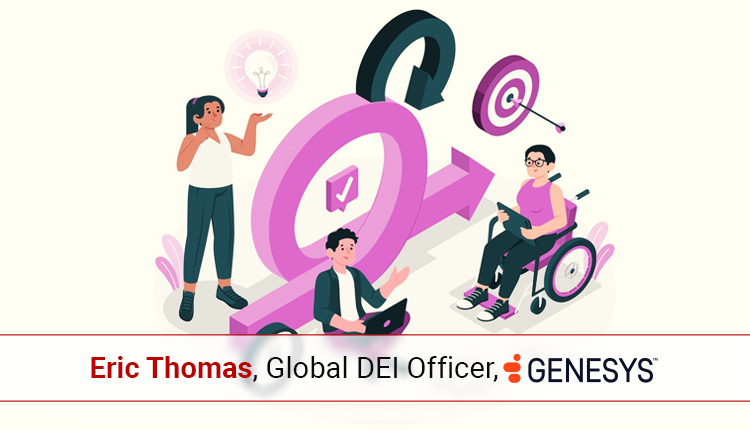By Eric Thomas, Global DEI Officer at Genesys
As today’s workplace has become increasingly diverse, effective and clear communication is essential to build and maintain strong, collaborative, and high-functioning teams. As organizations strive to build inclusive cultures that empower diverse teams to work at their best, there is one area that is often overlooked: workplace language.
Several commonly used phrases can inadvertently alienate or embarrass team members, reinforcing negative stereotypes and stigmatizing certain groups. By becoming more mindful and intentional with the language we use at work, we can foster an environment where all employees feel respected, included, and empowered.
Here are four commonly used workplace expressions that can unintentionally harm team dynamics.
“Blind Leading the Blind” – Rethinking the Use of Blindness as a Metaphor
“Blind leading the blind” is a frequently used phrase to describe an employee who doesn’t have a great understanding of a specific subject but is advising or guiding another employee. While the intent of the phrase is to highlight lack of knowledge or understanding, the metaphor itself can be unintentionally harmful as it uses a physical disability to demonstrate a point. This expression can perpetuate negative stereotypes and impact those who have vision loss.
Alternative: “Learning Together” or “Collaborating on New Challenges”
Rather than invoking blindness in the metaphor, consider using phrases like “learning together” or “collaborating on new challenges.” These alternatives share a similar meaning in a more collaborative and inclusive way, and foster a sense of shared responsibility and teamwork, where everyone, regardless of experience, is contributing to the success of the group.
“Tone Deaf” – A Phrase That Can Alienate Those with Hearing Loss
Another common expression in the workplace is “tone deaf,” typically used to describe someone who may lack awareness of the emotional or social context of a situation. The phrase “tone deaf” can negatively impact those who are hard of hearing – further stigmatizing this demographic of workers.
Alternative: “Out of Sync” or “Lacking Awareness”
Consider the above alternative phrases that focus on the behavior. These alternatives remove the reference of a common physical disability and can help contribute to an environment of inclusivity and learning.
Read More: Successful AI Integration Requires a Human Touch
“Killing It” – Using Violent Language to Celebrate Success
In today’s fast-paced work culture, the phrase “killing it” has become a common expression of praise, typically used to celebrate someone’s performance or success. While the intent is positive, the use of “killing” as a descriptor can be jarring for some individuals. The use of violent language – particularly the word “killing” – may be triggering for those who have experienced trauma or are sensitive to language that evokes violence or harm.
Alternative: “Great work!” or “You’re doing awesome!”
There are many other phrases that can be used to celebrate success and hard work without using violent language. Promoting praise in more traditional terms not only steers clear of potentially triggering language, but also contributes to a healthy and supportive work environment.
“Bombed” – Framing Failure as Catastrophic
Using the term “bombed” to describe something that completely failed or fell flat, can carry a heavy, negative connotation that frames failure as catastrophic. The phrase may be distressing for individuals who are sensitive to violent imagery, or who have experienced trauma. Words like “bombed” reinforce the idea that failure is something to be feared and avoided, when, in fact, failure can often be a valuable learning opportunity.
Alternative: “Learning Experience” or “Room for Improvement”
To effectively move away from violent imagery, using these alternatives can emphasize the value of mistakes as stepping stones to success, framing setbacks as opportunities to reflect and grow.
The alternate phrases can encourage employees to embrace a growth mindset and use momentary setbacks as opportunities to learn and develop new skills. Not only do these alternative phrases remove violence, they can also cultivate a more empathetic and understanding work environment where employees feel understood, respected, and encouraged to learn.
Conclusion: Small Changes, Long-Term Impact
As employers and employees, it is important to remember that our words can influence those around us in ways we may not anticipate or ever realize, as we can never know what a specific employee or coworker is going through. Refraining from mainstream, inadvertently harmful phrases can help us take a small step toward more inclusive and empathetic workplaces.
While it can be difficult to make changes to the language we use in the workplace, the long term benefits can include increased engagement, productivity, inclusivity, and belonging in the workplace. According to a 2021 BetterUp survey, employees show a 56% increase in job performance when they feel like they belong, making it clear that belonging can be an incredibly motivating force in the workplace.
By being more thoughtful about the language we use daily, we can influence our teams to not only be more productive, but also more compassionate and connected.
Read More : HRTech Interview with Ramesh Ramani, CEO and President at ExpertusONE
[To share your insights with us, please write to psen@itechseries.com ]

